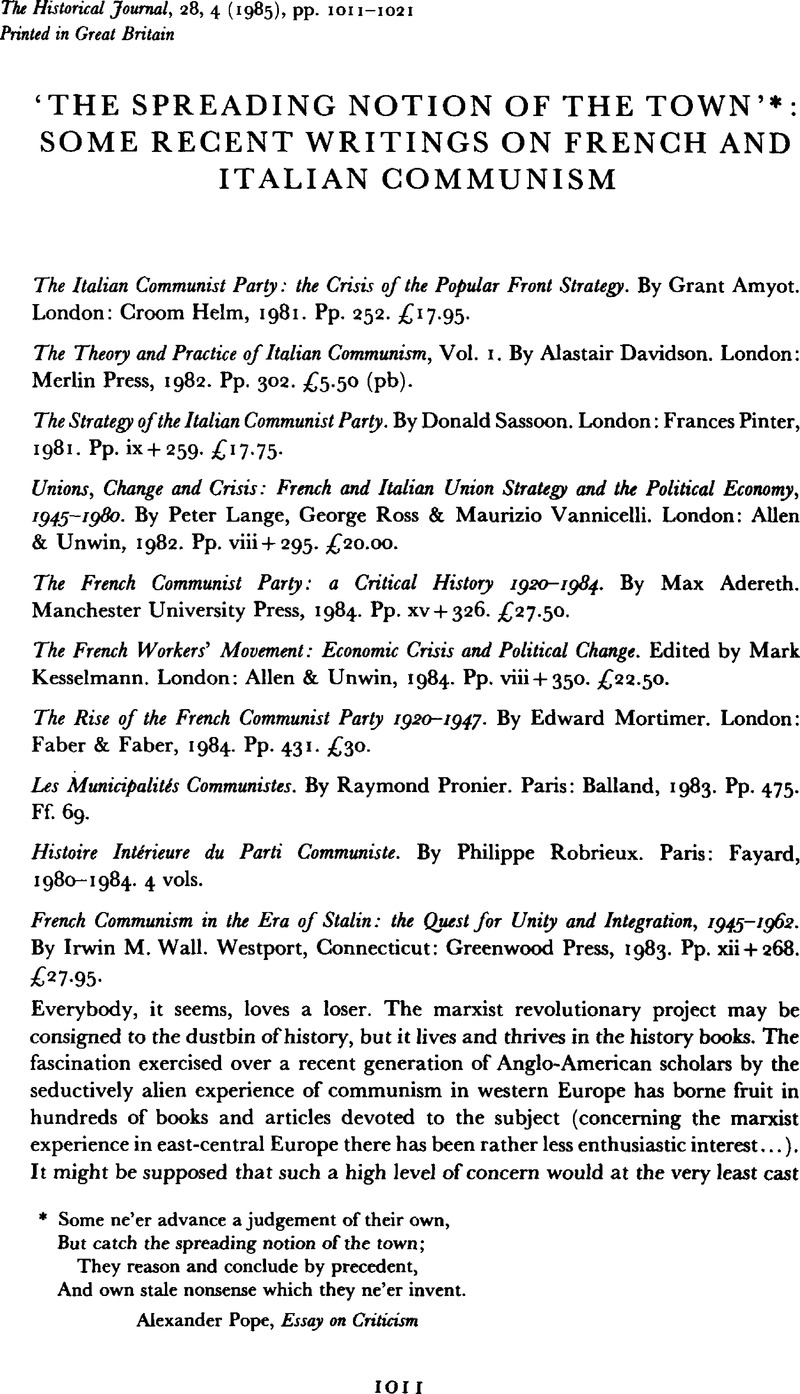Article contents
‘The Spreading Notion of the Town’*: Some Recent Writings on French and Italian Communism
Published online by Cambridge University Press: 11 February 2009
Abstract

- Type
- Review Articles
- Information
- Copyright
- Copyright © Cambridge University Press 1985
References
1 For a fuller discussion of the historiography of the PCF see Judt, Tony, ‘Une historiographie pas comme les autres: the French communists and their history’, in European Studies Review, XII (1982), 445–78CrossRefGoogle Scholar.
2 Among dozens of English-language studies, one might note the following: Femia, Joseph, Gramsci's political thought (Oxford, 1981)Google Scholar; Salamini, L., The sociology of political praxis. An introduction to Gramsci's theory (London, 1981)Google Scholar; Mouffe, Chantal, ed., Gramsci and marxist theory (London, 1979)Google Scholar; Adamson, Walter, Hegemony and revolution (Berkeley, 1980)Google Scholar; Clark, Martin, Antonio Gramsci and the revolution that failed (London, 1977)Google Scholar.
3 See e.g. Spriano, Paulo, Gramsci in carcere (Rome, 1977)Google Scholar.
4 Kriegel's, Annie best work is still her magnificent doctoral thesis, Aux origines du communisme français (Paris, 1964, 2 vols)Google Scholar.
5 For more detailed studies of the relationship between the French communists and the labour movement see Mouriaux, René, La CGT (Paris, 1981)Google Scholar and Ross, George, Workers and communists in France (Berkeley, 1981)Google Scholar.
6 On the famous meeting at Sklarska Poreba, see Reale, Eugenio, Avec Jacques Duclos, au banc des accusés à la réunion constitutive du Kominform (Paris, 1958)Google Scholar.
7 For the earlier period of Italian socialism, see Valiani, Leo and Wandruszka, Adam, eds., It Movimento operaioe socialista in Italia e in Germania dal 1870 al 1920 (Bologna, 1978)Google Scholar; Socialismo e Socialisti dal Risorgimento al Fascismo (Bari, 1974)Google Scholar; Spriano, Paulo, Socialismo e classe operaia a Torino 1892–1913 (Turin, 1958)Google Scholar.
8 For an interesting study of the way in which the PCI emerged from the resistance experience in a major province, see Travis, David, ‘Communism in Modena: the development of the PCI in historical context, 1943–1952’ (unpub. Ph.D. thesis, Cambridge, 1985)Google Scholar.
9 For these matters see Davis, John, ed., Gramsci and Italy's passive revolution (London, 1978)Google Scholar; Tarrow, Sidney, Peasant communism in southern Italy (Ithaca, N.Y., 1967)Google Scholar; Alicata, Mario, La Battaglia delle idee (Rome, 1968)Google Scholar.
10 See Nascimbene, A., It Movimento operaie italiano tra spontaneitá e organizzazione, 1860–1890 (Milan, 1976)Google Scholar; Merli, S., Proletariat di fabbrica e capitalismo industrial: il caso italiano, 1880–1900 (Florence, 1976)Google Scholar; Riosa, A., It sindicalismo rivoluzionario in Italia e la lotta politico net partito Sodalista dell'eta giolittiana (Bari, 1976)Google Scholar.
11 On this theme see Judt, , Marxism and the French Left (Oxford, 1985)Google Scholar, chapter 2.
12 On Stalinism in France see Desanti, Dominique, Les Staliniens (Paris, 1974)Google Scholar; Legendre, Bernard, Le Stalinisme français (Paris, 1980)Google Scholar and Ladurie, E. Le Roy, Paris-Montpellier: P.C.-P.S.U. 1945–1963 (Paris, 1982)Google Scholar. A case study in the mood of the period can be found in the work by Malaurie, G. and Tertée, E., L'affaire Kravchenko (Paris, 1982)Google Scholar, while a more recent series of events is chronicled in Kremlin PCF: conversations secrètes (Paris, 1984)Google Scholar, dealing with the relations between the PCF and Moscow at the time of the invasion of Czechoslovakia.
13 For the Italian labour movement see, in addition to works noticed here, Couffignal, J., Les syndicats italiens et la politique (Grenoble, 1978)Google Scholar; Problemi dell movimento sindicale in Italia, 1943–1974 (Milan, 1976)Google Scholar; Craveri, P., Sindicato e istituzione nel dopoguerra (Bologna, 1977)Google Scholar.
14 Among many studies of communists in local government see most recently Kertzer, D., Comrades and Christians: religion and political struggle in communist Italy (New York, 1980)Google Scholar, and Lacorne, D., Les notables rouges (Paris, 1980)Google Scholar.
15 Although this comment is directed for the most part at political commentators in this country and the U.S.A., it applies with equal force to a number of leading French experts, most notably Georges Lavau (see hisA Quoi sert le Parti Communiste Français? (Paris, 1981)Google Scholar, notably chs. 1 & 2).
- 1
- Cited by


